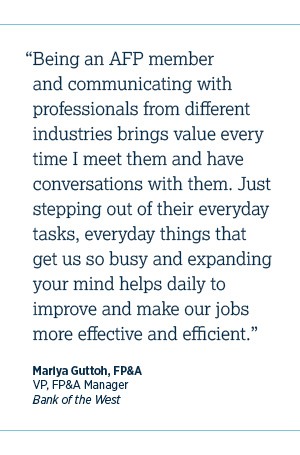Tracy Butler, CTP
CFO
The finance profession is powerful. Constantly advancing, expanding and evolving, treasury and finance are full of possibilities for anyone who has the desire to learn and achieve.
As part of AFP’s Diversity, Equity and Inclusion (DEI) Awareness Initiative, we’re featuring stories from financial professionals on how they got into the profession and advice for young financial professionals interested in careers in treasury and finance. In this interview, Tracy Butler, CTP, CFO, describes her experience entering the financial field and how she navigated her career journey.
AFP: Share your experience entering the financial field.
Butler: When I graduated from college, I did not know exactly what I wanted to do with my business degree. I entered consulting where I could have real-world exposure on all aspects of business: from finance to organizational design, to human resource and beyond. As a consultant, I helped companies identify opportunities to grow their business and increase efficiency. While finance was an element of the scope as part of management consulting, it was also the most essential in my mind as robust financial planning is imperative to ensure sustainable long-term business growth and financial resources alignment to strategic priorities. Eventually, I entered the more specialized financial field, creating long-range financial plans, capital expansion plans and financing strategies.
AFP: What advice would you give to young financial professionals just starting out in their career?
Butler: My first piece of advice is to be open-minded. Be open to new ideas and different perspectives, and always look for opportunities to improve. Do not do things because it has “always been done this way.” I was able to take on more responsibilities over time in different areas of finance because I was always willing to learn new things and explore new areas; the experiences and mindset prepared me for my current role as the CFO.
Secondly, be curious. Ask questions, actively listen, learn what your customers and partners and supervisors need, and understand issues fully before jumping to solutions.
AFP: What does the future of finance and treasury look like to you?
Butler: The future of finance and treasury includes better data-driven decision-making with better reporting through automation and data intelligence; more collaboration and business partnership between finance and operations; and a more value (vs. cost) focus. In addition, finance and treasury should eventually have a balance of short-term goals with long-term outcomes when evaluating business investment opportunities.
AFP: Did you have a mentor, or were you part of any groups or influenced by anyone as you navigated your career journey?
Butler: I am a natural learner, so I see opportunities to learn through every interaction and from almost everyone I cross paths with. I have learned from both great leaders and individuals who did not have the right skill or mindset to do the job over. I also believe in the importance of developing technical and soft skills. Many financial professionals place so much emphasis on technical skill development, but the emotional intelligence and soft skills are what get you to the senior and executive levels.
AFP: Have you accomplished anything big for your organization?
Butler: I have helped my organization to secure the highest credit rating in the country; closed the first and only federal Master Credit Agreement with four loans in the total amount of $2B; and have transformed
our finance team from a compliance-driven, report-intensive function to strategic partner to customers to collaboratively accomplish business objectives.
In addition, I have led my team to integrate short-term budgeting with
long term financial planning to ensure alignment of resources with strategic priorities. We now no longer focus on cost cutting and historical performance and instead focus on creating values, maximize benefit and optimize decision-making.
AFP: What are some stereotypes of the finance world you would like to debunk?
Butler: Oftentimes, the finance function is perceived as risk adverse, compliance-driven and solely cost-focused. If finance is positioned correctly, it is one of the most powerful enabling business functions that can be strategically focused and value-focused, as well as the best partner for operations, senior leadership team and the Board to help a company to accomplish its goals.


